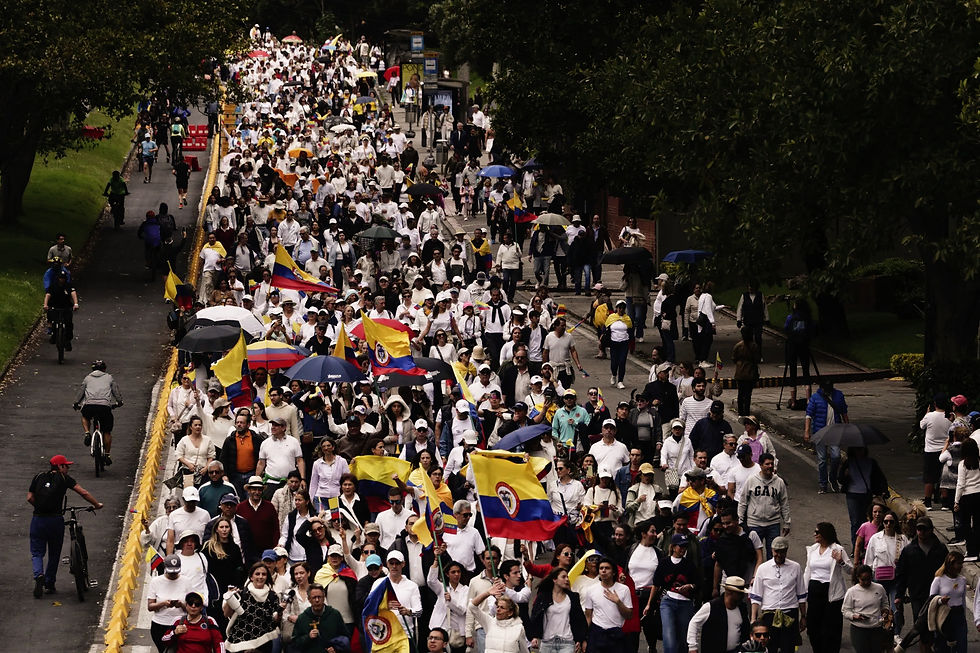Colombia Bleeds Again
- Sebastián Lucio
- Aug 11, 2025
- 3 min read
They killed a presidential candidate. Silence is no longer an option.

August 11, 2025. Shots fired. A man down. Dreams shattered. Violence returned. That’s the story dominating headlines here in Colombia after the murder of presidential candidate Miguel Uribe Turbay. He died today, two months after the brutal attack that shook the country and left us holding our breath.
Many are calling this a flashback. Like that afternoon in 1989, when presidential candidate Luis Carlos Galán was shot and murdered. Or in 1948, when Jorge Eliécer Gaitán, one of Colombia’s most promising leaders, was also assassinated, his future stolen by those who feared him in power.
History feels like it’s repeating itself, haunting us through headlines we can’t seem to break.

My name is Sebastián Lucio. I’m 18 years old, born and raised in Bogotá. And it hurts to see my country bleed like this.
Right now, headlines, fear, and tears fill the streets of Colombia. But behind all of this, a larger picture exists, one that the media and the public overlook. Political violence in Colombia is not new. It didn’t just return It never truly left us; we merely chose to ignore it.
My country’s history is daily stained with the blood of social leaders, protesters, and many other voices silenced by violence and fear. Political violence affects Colombia every day, impacting every corner of the country, even those covered beyond the media.
Between ignorance and misinformation, Colombia’s fate has been driven again to a period of fear, crime, hate, and uncertainty. For years, violence was kept outside the main cities and was not affecting the daily lives of the people in them, but now more than ever, people, and us youth, are directly affected after the assassination of the presidential candidate.
And this isn’t just about fear. Research shows political assassinations truly hurt democracy itself. A recent study at Northwestern University found that targeted killings of political leaders can drive citizens away from the polls, especially in zones directly affected by conflict. Violence doesn’t just take lives; it robs people of their voice. And that is exactly what those who pull the trigger want.
To be honest, the country is more divided than it has more than ever been. Both the left-wing government (the first in Colombia's history) and the right-wing party, use social media not just to share their ideas, but often to attack opponents and even incite violence among their followers.
With a new election coming up next year, no one really knows in which direction the current government is headed. With all this uncertainty in the air, fear, division, and distrust seem to grow. Tensions are running high, creating an environment where neither extreme can coexist because of the hatred shown by their leaders and by the actions of the people. Just like the one in charge of killing presidential candidate Miguel Uribe.

As a part of youth in Colombia, I make a plea for information and change. We are tired of violence, hate, and destruction. Colombia is a beautiful country full of diversity, riches, and smart people. But we are being blinded by fake idols, extremist ideas, that instead of trying to build a stable country, are focused on making themselves richer and their friends more powerful.
We need to wake up!
This hate that divides us only seems to make us vote for incompetent leaders that do nothing to unite the country.
There is a man in a coffin right now, outside of his political values and his political ideas. He was a father, a husband, and a son, who was killed because of what he stood for. Colombia cannot be allowed to go back to those days, where murder because of political ideas shaped everyday life.
But real change won’t happen if we stay stuck in the past, replaying what was, what could’ve been, or what someone once said.
From the pain, we have to find our power to keep going.
It’s time for the people in the seats, especially young people, to speak up.
To vote not for symbols or slogans, but for a united future.
For the country we deserve.
Bibliography:
Arjona, A. (2025, May 19). Political assassinations lower voter turnout in Colombia: New study challenges assumptions about the aftermath of civil war violence. Institute for Policy Research, Northwestern University. https://www.ipr.northwestern.edu/news/2025/political-assassinations-lower-voter-turnout-in-colombia.html
Valencia, I. H. (2025, June 30). Violencia política y contra la población civil: Las dinámicas de conflicto en el país y sus impactos. El Espectador. https://www.elespectador.com/colombia-20/paz-y-memoria/violencia-politica-y-contra-la-poblacion-civil-las-dinamicas-de-conflicto-en-el-pais-y-sus-impactos/
Formación Humanística Udenar. (2023, October 24). Historia de la violencia política en Colombia [Video]. YouTube. http://www.youtube.com/watch?v=w4-PaqgDPX4
Zambrano Pérez, M. (2020, December 27). La derecha, el centro y la izquierda en Colombia. Zona Cero. https://zonacero.com/opinion/la-derecha-el-centro-y-la-izquierda-en-colombia










Comments